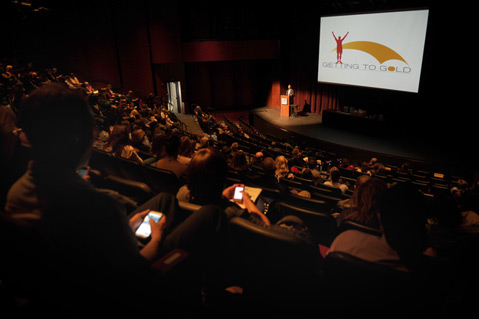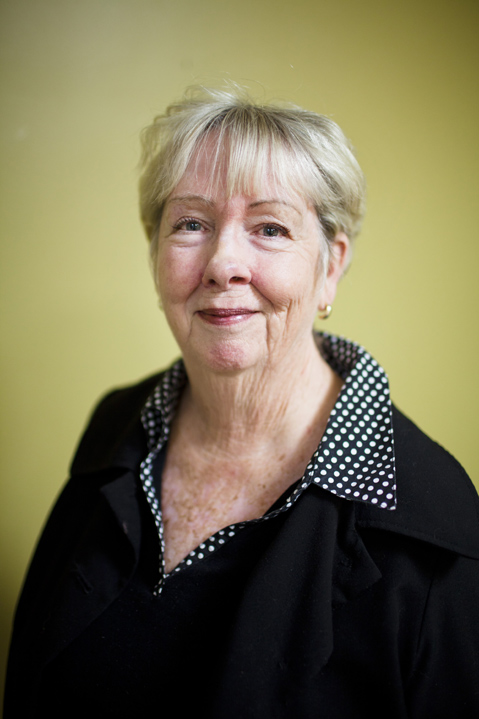‘Get Focused, Stay Focused’ Hosts Conference at SBCC
Former City College Dean Presents High School Career Planning Program to Educators

Diane Hollems knows a thing or two about pursuing a haphazard path. In her forties, as a mother of three who had careers as a stockbroker and flight attendant, she went back to school to get a Ph.D. in Communication at Louisiana State University.
In 1998, Hollems moved to Santa Barbara to take a temporary grant-writing job at SBCC before becoming a dean the next year. “I fell in everything,” she said, “Which is what we try to address in this program: Try not to do that.”
According to Hollems, who retired from SBCC last July, the program “Get Focused, Stay Focused” seeks to inspire students to cultivate skills for their college and career experiences so they are more successful once they get there. The curriculum is a semester course often paired with a semester health class.

The idea is rather simple: get kids thinking about who they want to be — and how they plan to get there — so they don’t waste time and money bouncing around between majors once they get to college. “The world of student loans is not friendly,” Hollems said.
In the area currently, Santa Barbara High School and Carpinteria High School have adopted “Get Focused, Stay Focused” since its founding in 2009. Statewide, 132 schools use the program. On Thursday and Friday, Hollems will host a conference at SBCC for high school educators across the state who use the program and who don’t.
Before the conference, Hollems sat down with The Santa Barbara Independent to explain further.
Do you run into critics who say young people should be exploring and should not limit themselves?
We do. There are two ends to the spectrum. One end is pushing kids younger and younger to choose a career. They are kids. They should be having fun. They can learn about careers, but making college decisions too early — “Which college am I going to go to?” in 7th grade — that’s really limiting. That’s one end. The other end is, “Take your time — explore, explore, explore.”
As a Ph.D. student at LSU, my professors wanted me to float around in the program. [They’d say],“Don’t worry about writing your dissertation. You have 10 years. That’s the norm.” [I said], “I have three kids at home. I don’t have 10 years.” That was the philosophical thinking. Well, there is a happy medium, which is to learn about careers and keep learning about careers.
In this program, they spend a semester in 9th grade researching those careers and then in 10th grade they do more research for other careers. In 11th grade, they are still doing research on more careers. The platform is such that they can go in and change that direction. They learn how to change it and update their goals so when they matriculate to college they can work with their college counselor.
It’s not as if that career pathway can’t be changed, but the skills learned along the way are valuable.
If money is not an issue, do you see benefit in exploring?
I think there is always a benefit in education. Period. We want to be lifelong learners.
How do you measure the success of the program?
There’s lots of [preliminary] data. Carpinteria High School has done the program with fidelity since the beginning. Their test scores doubled. Decreases in suspensions. The pass rates for courses to get into UCs and Cal States has risen.
A study is underway with Dr. Russell Rumberger, who recently retired from UCSB.
We have 18 schools that have committed to a randomized study. Randomly, half of those school will start with Get Focused, Stay Focused and the other half agreed to wait to fall 2017. They will all be at the conference.
What about skills for an industry that could be virtually extinct in five years?
That’s what we call transferable skills. You can think of many. Even Barnes & Nobles has moved online. So what everybody needs is to navigate that. Everything is a little behind because of funding issues. That is going to be the question — how do you build transferable skills into students’ lives?
Where do you see this program going?
We would love to see every high school in America doing the program. That’s not realistic, but as a reform movement we want to get people to understand the importance of flipping the paradigm. Don’t pick your college first. It’s going to cost you time and money and who knows what else down the road. Research your career first. Build the major and the college around those desires. In order to do a paradigm shift takes time. Hopefully more and more schools get involved.



